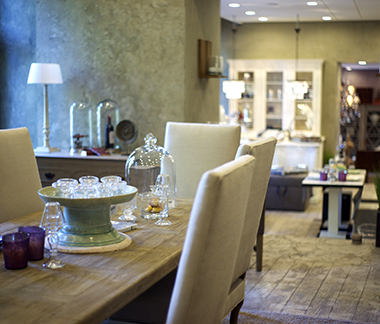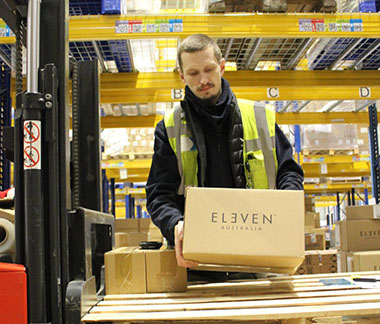Article from Journal La semaine de Nancy : Logistics: to achieve carbon neutrality, we are changing everything!
Logistics and transport: the environmental challenge is as colossal as it is necessary.
So in Lorraine, we are adapting. At the end of last year, the giant FM Logistic reiterated its "Powering 2030" plan to achieve carbon neutrality within seven years. In its wake, the entire industry is undergoing a revolution.
The plan of logistics company FM Logistic, called "Powering 2030", has a clear objective: to achieve carbon neutrality by 2030. At the heart of the challenge is transport. The logistics company (1.5 billion euros in turnover, 27,600 employees) based in Phalsbourg, intends to reduce the greenhouse gas emissions linked to this activity by 30%. So we have to get organised.
On the agenda: pooling deliveries, planning the number of vehicles deployed by adjusting the size of the packages, and innovation. In France, 30 of the group's trucks already run on Oléo 100, a French-made biofuel capable of reducing CO2 emissions by 65% per cent compared to diesel.
In the face of the climate emergency and while road transport was releasing 123.3 million tonnes of CO2 into the environment before the pandemic, according to government figures, green fuels or biofuels are multiplying and becoming more widespread.
Viaposte, a subsidiary of La Poste, which has a platform in Fontenoy-sur-Moselle, identifies and uses several of them: ED95 fuel, of plant origin, compressed natural gas (CNG) and liquefied natural gas (LNG), biodiesel from recycled vegetable oils, the fuels of the future which will be the fruit of the transformation of agricultural and forestry residues, etc.
In Phalsbourg, the Bouché group (165 employees, €25 million in turnover) uses alternative fuels such as CNG or LNG to reduce its carbon footprint. But the company is going further since the signing of a professional training agreement that is renewed every year. The agreement establishes a culture of energy saving among drivers, who receive personalised support from an instructor. This system will enable the Moselle-based company to maintain an average fleet consumption of 28 litres/100 km.
Raising employee awareness is also one of the levers used by Viaposte. The group trains its drivers and transporters in eco-driving, helping them to maintain a constant speed to limit untimely acceleration and braking.
To go green, others are focusing on improving existing equipment. "We install diesel economisers on our vehicles, which reduce consumption by 3 litres/100 km. The equipment costs approximately 3,000 euros but leads to less pollution while being cost-effective in the long run, especially since fuel prices have soared," says Bruno Fra, president of Fra Transport (40 employees, turnover of 6 million euros), based in Richardménil, which has 45 of its own vehicles.
And what about electric cars? "The day it becomes possible, we'll be happy to go for it. We have to make urgent deliveries over long distances. No electric vehicle would allow us to do this without recharging on the way," confesses Sébastien Haulet, CEO of HK Courses, also based in Phalsbourg (38 employees, turnover of 13 million euros). However, there is no question of doing nothing. "To ensure our deliveries, our company relies mainly on its 3,000 subcontractors. We are in the process of setting up a method using software to track the amount of CO2 emitted during the journeys. Customers are increasingly asking for this information on their invoices. For our part, the carbon footprint of subcontractors tends to become a criterion for choosing", warns the manager, who is also in the process of deploying a strong policy of corporate social responsibility (CSR), with a section on the impact of pollution caused by journeys.
The transformation of warehouses
Back to the giant FM Logistic. Its Powering 2030 plan includes an approach that also encompasses the general operation of warehouses, so that the facilities can become carbon neutral by 2030. Each of the group's buildings is now designed to optimise operational and energy performance, from design to operation. Over the 2021-2022 financial year, the group is expected to reduce its energy consumption by 25% in its emissions from its warehouses (when the target was 20%).
The company is also gradually moving towards energy autonomy at its sites. Photovoltaic panels are installed at sites in France, Italy, Spain, Brazil and India, generating almost 3,000 megawatt hours (MWh) of green electricity. In Brazil, one of the group's platforms uses solar energy to avoid 43 tonnes of CO2 emissions per year. At the same time, green hydrogen is being produced with a first manufacturing unit at the Illescas site in Spain. Others, such as those in Hanoi, Vietnam, and Farrukhnagar, India, are in the pipeline, recognised by certifications attesting to their high level of environmental performance. Since the energy crisis that has hit the logistics sector hard, the Moselle-based company has identified 75 priority energy optimisation actions that should "reduce the energy consumption of the entire group by 7% per year by 2030 and by almost 15% in 2023, specifically in France," says a press release.
At a giant of another scale, Amazon prioritises the rehabilitation of existing infrastructures, which is accompanied by a strong energy-saving policy, when it comes to new locations. In Augny, the distribution centre, which covers 182,000 square metres of floor space, was built on a rehabilitated disused area. 6,000 shrubs and 500 trees were planted, and rainwater recovery tanks, solar panels, electric vehicle charging stations and bicycle parking facilities were installed, as was a complete switch to LED lighting.
"Amazon plans to invest one billion euros in Europe to continue decarbonising its transport network, including 250 million in France to achieve net zero CO2 emissions by 2040," explains the American group's French communications department.
Towards sustainable offers for customers
To meet the environmental challenges, the game is not only played in the transport or transformation of sites. FM Logistic wishes to support its customers in their transition by offering them sustainable logistics solutions adapted to their objectives. Thus, the Moselle-based logistics provider wants “all the group's businesses integrating sustainable offers by 2050.” Currently, these generate 13% of turnover but should reach 20% by the end of 2023. FM Logistic has thus "developed a dashboard measuring the impact of warehousing and transport. The dashboard presents the impact in CO2 equivalent of the logistics services per customer and per installation", says another press release. In France, the logistics industry employs 1.5 million people. By 2030, a growth of about 20% is expected. Above all, by 2030, the entire sector in Lorraine will probably have completed its necessary green revolution!








